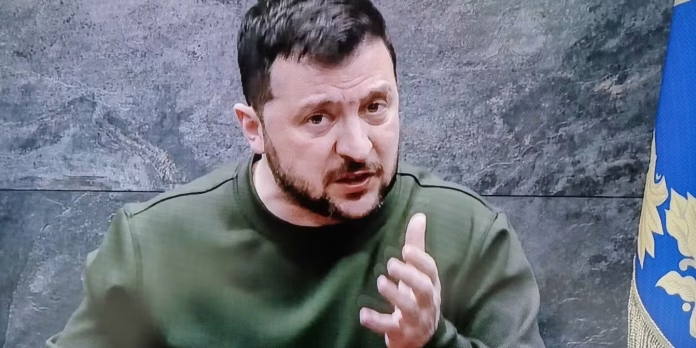President Volodymyr Zelensky, once hailed as a war hero, is now facing some of the most difficult days of his presidency.
Aid Cut and Protests Rock Ukraine’s Leadership
On the 54th anniversary of the Apollo 11 moon landing, thousands of Ukrainians gathered—not to celebrate space achievements, but to protest against their own war hero. This marks the first major protest against Zelensky’s leadership since Russia invaded Ukraine in 2022.
The reason for the protest is a new law that critics say weakens Ukraine’s fight against corruption. This new law gave more power to a political figure called the Prosecutor General, allowing them to control two important anti-corruption agencies. These agencies, the National Anti-Corruption Bureau (NABU) and the Specialized Anti-Corruption Prosecutor’s Office (SAPO), were set up to fight corruption at the highest levels of government. Now, many believe their independence is under threat.
The European Union (EU), once one of Ukraine’s strongest supporters, responded by freezing €1.5 billion (about $1.7 billion) in aid. This money was part of a €4.5 billion package meant to help Ukraine recover from the war and get closer to joining the EU. The EU made it clear: if Ukraine wants the money, it must stick to its promises about fighting corruption.
This decision shook Zelensky’s administration. Although he quickly proposed a new law to undo the changes and restore the agencies’ independence, the damage had already been done. Many Ukrainians felt betrayed, and the EU is still waiting to see whether the country will meet its rules on good governance before sending more funds.
Inside Ukraine, Trust Begins to Crack for War Hero
Protests spread quickly across Ukraine, with the biggest crowds forming outside the parliament building in Kyiv. People held signs, waved flags, and chanted slogans demanding that NABU and SAPO stay free from political influence. Many said they feared that weakening these agencies would allow corruption to grow again, just as Ukraine was making progress toward transparency.
Zelensky, who rose to power with promises to fight corruption, remained silent during the initial backlash. His refusal to comment publicly about the EU aid freeze only made things worse. Behind closed doors, officials expressed concern that the president’s decision could push Ukraine further away from its western allies.
These fears are not unfounded. The law that sparked the protests was seen by many as an attempt to control the people who were investigating high-ranking government officials. Some even say the law was designed to protect certain individuals close to the president, though these claims have not been proven.
One of the people mentioned is a former deputy prime minister who was being investigated by SAPO. This case, along with others, made some Ukrainians wonder if the government was more interested in protecting its friends than rooting out wrongdoing.
Zelensky later tried to calm the situation by reversing his earlier decision and supporting a new law to protect the independence of NABU and SAPO. But even with that step, the public’s trust had already taken a hit.
Pressure from Allies and Financial Institutions Increases
Outside Ukraine, pressure is also growing. The International Monetary Fund (IMF) has warned Ukraine that it could lose out on its $15.6 billion aid package unless it follows through on its promises to fight corruption. This money is critical for Ukraine’s economy, which has suffered deeply because of the ongoing war with Russia.
Sanctions hit hard — Zelensky urges final blow as Russian economy spirals
The IMF has asked Ukraine to appoint a new head of its Economic Security Bureau. This post has been left empty, and Zelensky has so far refused to name the candidate recommended by an independent commission. This candidate had led an investigation into the same former deputy prime minister involved in the SAPO case. Zelensky’s refusal has raised even more eyebrows among Ukraine’s international partners.
Meanwhile, the European Union has voiced serious concern. EU Commissioner for Expansion Marta Kos said that Ukraine’s actions raised “serious questions” about its commitment to fair governance. The EU says it will release the frozen aid only after Ukraine proves that it still values transparency and independence in its institutions.
The political drama comes at a time when Ukraine is still fighting off Russia’s invasion. Every dollar and euro counts, and losing support from allies could hurt the country’s ability to recover and rebuild.
Many in Ukraine and abroad are now watching closely. The protests may have quieted down, but the tension remains. For President Zelensky, a leader once praised for his bravery and strength, these new challenges are putting his promises and his legacy to the test.
